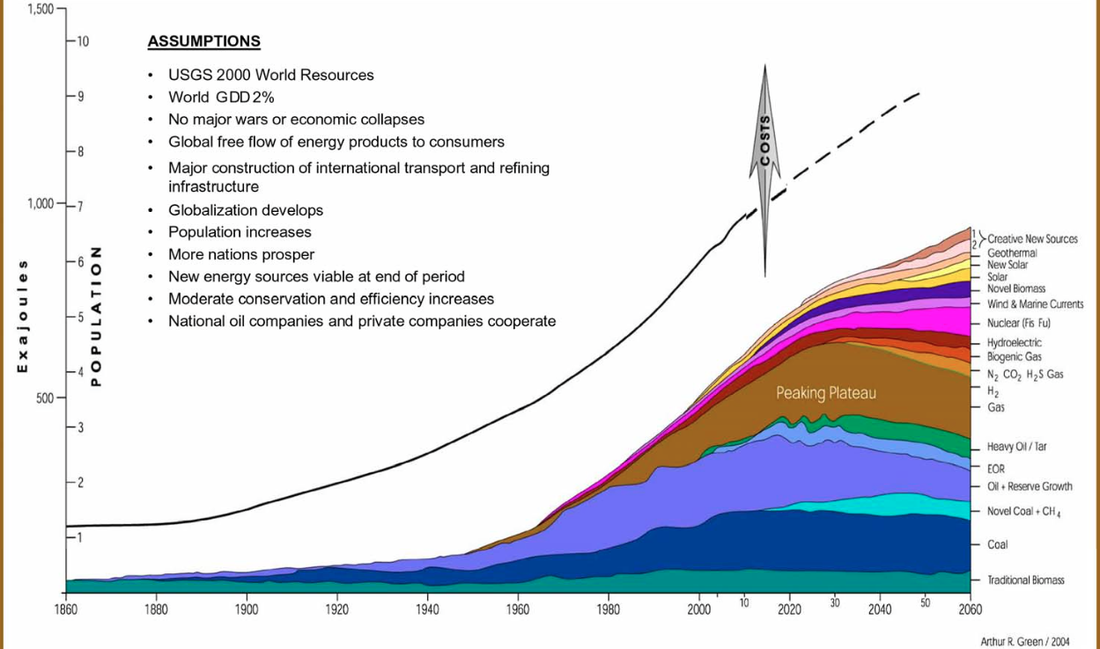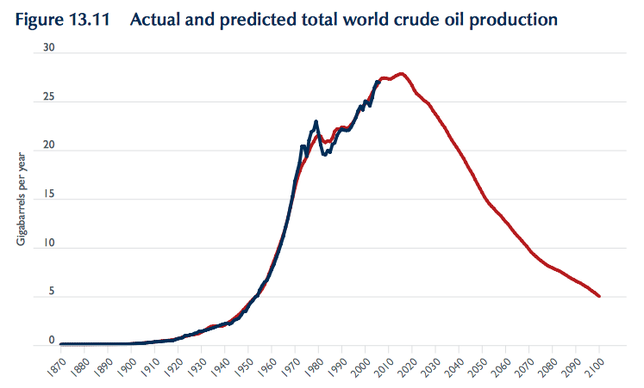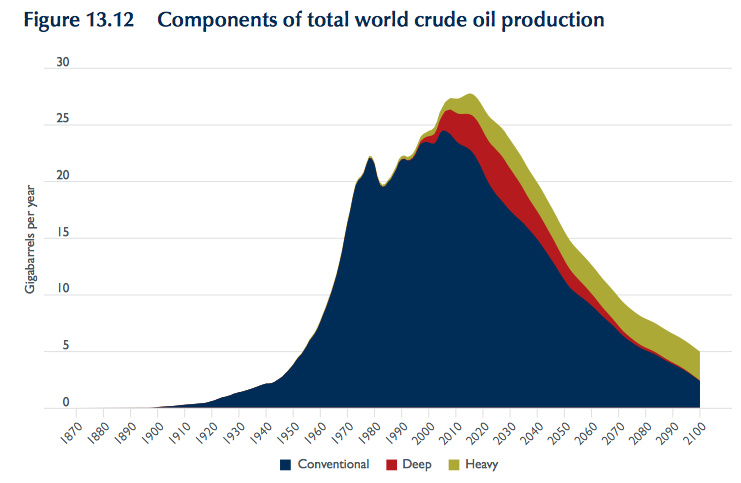|
Those who are either unaware of or unconvinced by the evidence pointing to the massive changes we are facing in the very near future usually react with hope that it will effect some future where we have magical technology to fix it or dismiss it out of hand as conspiracy theory. Usually though these people will be more apt to listen if you give them mainstream credible sources. In this post I will give those people something to chew on: expert opinions and projections from the very highest levels of government. I will cite sources from the USGS (United States Geological Survey), the USDOE (United States Department of Energy), the NETL (National Energy Technology Laboratory), the US Joint Forces Command, and Presidential energy advisors. What follows is a relatively brief overview; it barely scratches the surface but is enough to prove my point. These days it would seem as if a raging debate divides oil experts, with prophets of imminent shortage pitted against believers in at least a couple more decades of abundance. A closer look will make that "raging debate" a bit more tame and in context. They were saying "a couple more decades of abundance" a couple decades ago. On the optimistic side, a USGS World Petroleum Assessment was done in 2000. This quite optimistic study concluded that there was at least 50 percent more oil left than the pessimists believed, much of it in the Middle East. It further predicted that new technologies would wring additional supplies from existing fields, and that new reserves remained to be found. Thomas Ahlbrandt, the geologist who led the USGS study and arguably the foremost expert in the field at the time, said in an interview after the study was done though that even the larger reserves he envisioned couldn't sustain the world's growing thirst for oil for very long. He said: "Oil and gas are limited. My personal feeling is, we have a concern in the next two decades." This is a staggering thought. This was said in the year 2000 and was the most optimistic outlay for the future at the time. This was, and has been, the view that the pessimists rally against, and the study concluded a global production decline in 2025. A study done 7 years afterwards concluded that the actual historical data from the year of the study had been tracking pretty accurately thus far (up to 2007) to what the USGS 2000 World Resources study had projected. For a summary, click here. The United States Joint Forces Command regularly (about every two years) issues its “perspective on future trends, shocks, contexts and implications for… the national security field.” In 2008 and 2010 it issued Joint Operating Environment assessments which were almost identical. Energy moved to the forefront of their reports in these years even amidst all the other very real security concerns. In the report it said: A severe energy crunch is inevitable without a massive expansion of production and refining capacity. While it is difficult to predict precisely what economic, political, and strategic effects such a shortfall might produce, it surely would reduce the prospects for growth in both the developing and developed worlds. Such an economic slowdown would exacerbate other unresolved tensions, push fragile and failing states further down the path toward collapse, and perhaps have serious economic impact on both China and India. At best, it would lead to periods of harsh economic adjustment. To what extent conservation measures, investments in alternative energy production, and efforts to expand petroleum production from tar sands and shale would mitigate such a period of adjustment is difficult to predict. One should not forget that the Great Depression spawned a number of totalitarian regimes that sought economic prosperity for their nations by ruthless conquest. Other interesting lines from the report are ones like these: “A severe energy crunch is inevitable without a massive expansion of production and refining capacity.” "... the dangerous vulnerabilities the growing energy crisis presents..." “The implications for future conflict are ominous.” “... production could reach a prolonged plateau. By 2030, the world will require production of 118 MBD (million barrels per day), but energy producers may only be producing 100 MBD unless there are major changes in current investment and drilling capacity.” In 2005, the United States Department of Energy published a report titled Peaking of World Oil Production: Impacts, Mitigation, & Risk Management. Known as the Hirsch report, it stated: The peaking of world oil production presents the U.S. and the world with an unprecedented risk management problem. As peaking is approached, liquid fuel prices and price volatility will increase dramatically, and, without timely mitigation, the economic, social, and political costs will be unprecedented. Viable mitigation options exist on both the supply and demand sides, but to have substantial impact, they must be initiated more than a decade in advance of peaking. Now, most people are naturally suspect when it comes to trusting the government. So when the foremost experts in the government issue a report that says these things, in this language, my ears perk up. This is basically the most realistic official report you're going to read on the subject. And if the language is this negative, then the real picture must be very dire indeed. The Hirsch Report included a multitude of frightening conclusions: - World production of oil will peak within two decades (from 2005), is going to happen, and will likely be abrupt. - Without massive mitigation efforts (from which the economic loss to the United States could be measured on a trillion-dollar scale), the problem will be pervasive and long-term. - Mitigation efforts will require substantial time, and waiting until production peaks would leave the world with a liquid fuel deficit for 20 years. - Motor vehicles, aircraft, trains, and ships have no ready alternative to liquid fuels. - Previous energy transitions (wood to coal and coal to oil) were gradual and evolutionary - oil peaking will be abrupt and revolutionary. - Initiating a mitigation crash program 10 years before world oil peaking helps considerably but still leaves a liquid fuels shortfall roughly a decade after the time that oil would have peaked. The conclusion of the report said this: The world has never confronted a problem like this, and the failure to act on a timely basis could have debilitating impacts on the world economy. Risk minimization requires the implementation of mitigation measures well prior to peaking. The world seems to need at least twenty years notice and a serious coordinated effort in order to truly avoid sever economic pain. The global economy could stand to suffer incalculable consequences if peak oil is already upon us. When you combine both the 2000 USGS report with the 2005 Hirsch report, you come to some startling conclusions about the future. The USGS report in 2000 came to the optimistic year of 2025 yet the Hirsch Report said in 2005 that there needs to be at least twenty years notice and a serious coordinated effort to avoid disastrous results. If that's true then those efforts (on the scale of the previously mentioned trillions of dollars) needed to be enacted the same year that the report came out (in 2005). It is now 2016, 11 years afterwards, and no such thing has happened. We are already 11 years too late, even according to the optimists. Dr. Robert L. Hirsch, the man who headed the team who wrote the seminal report "Peaking of World Oil Production: Impacts, Mitigation & Risk Management" for the U.S. Department of Energy’s National Energy Technology Laboratory (DOE-NETL), after the report was written, had this to say about it: "When the report was done, management at NETL really didn’t know what to do with it because it was so shocking and the implications were so significant. People in the Clinton administration had talked about peak oil, including President Clinton and Vice President Gore, and the same thing is true in the Bush administration, and the same is true, to the best of my knowledge, in the Obama administration. Peak oil is a bigger issue than health care, than federal budget deficits, and so forth. We’re talking about something that, to take a middle of the road position—not the Armageddon extreme and not the la-la optimism of some people—is going to be extremely damaging to the U.S. and world economies for a very long period of time. At some point we’ll come out of this because we’re human beings, and we just don’t give up. And I have faith in people ultimately. But it’s a bad news story and anybody’s who’s going to stand up and talk about the bad news story and is in a position of responsibility in the government needs to then follow immediately and say 'here’s what we’re going to do about it,' and no one seems prepared to do that." CONCLUSION: Until the turn of the century, peak oil had been the subject of decades of public denial. Much of this still infuses the uneducated populace, but it is no longer the case for those who study such things. The oil industry, the governments of the world, top companies, and scientists all have acknowledged the reality. But, still, it is upon us with little forewarning to the general public at all. Trouble is right around the corner. We are rapidly going to have to deal with less and less oil, since there has been little forewarning and no planning on a national scale. The changes necessary to implement a transition away from oil dependence on a national scale has been estimated in the trillions of dollars and needs at least 20 years. We don't have 20 years, as has been pointed out. And the world debt crisis prevents the expenditure of the necessary funding. Because in the early 70's we did not look long-term and instead implemented a mindset of exponential growth, we are now having to deal with increasingly short-term continued crisis situations that prevent dealing with these perceived catastrophic events of the future. There are no realistic solutions on the national scale - there are theories, but no implementation. Global upheavals to our way of life are poised to happen in less than 10 years, and current and past policy has prohibited a timely solution that would allow the negative consequences to be mild. A perceptive reader might be wondering at this point why the projected consequences have not played out yet. The 2000 USGS report and the 2005 DOE Hirsch Report came to some rather sobering conclusions, and said that they should be happening by about 2015. It turns out that 'peaking' of resources can only be shown in hindsight. There has to be years of hard data, rather than projected data, before a peak can be seen to have happened. Today, all of the experts agree that conventional oil peaked globally in 2005-2006. What has saved us thus far, and pushed the dire consequences forward by some years, is unconventional sources of oil. More precisely, it is a combination of massive debt and new technologies that have given us this breathing room. More studies done recently - in the 2010 to 2015 time frame - have come to the conclusion that this will not last after 2016. One such study by the Australian government said its prognosis was "for a slightly upward sloping plateau in potential production from 2005 to 2016, before crude oil production declines begin in earnest." A German military study confirms this viewpoint. The study puts it plainly when it states: "...it is the projected expansion of deep water and non-conventional heavy oil production that turns what is predicted to be a 2006 peak in conventional oil into a more drawn out plateau over 10 years for total crude." And so here we are. As I write this it is October 2nd of 2016. We stand on the precipice of a new world. The feeling brings to mind the last few lines of The Great Gatsby by F. Scott Fitzgerald: And as the moon rose higher the inessential houses began to melt away until gradually I became aware of the old island here that flowered once for Dutch sailors’ eyes—a fresh, green breast of the new world. Its vanished trees, the trees that had made way for Gatsby’s house, had once pandered in whispers to the last and greatest of all human dreams; for a transitory enchanted moment man must have held his breath in the presence of this continent, compelled into an æsthetic contemplation he neither understood nor desired, face to face for the last time in history with something commensurate to his capacity for wonder.
1 Comment
johnny
12/21/2017 05:19:52 pm
The Hirsch report became out of date around the time resource plays revolutionized US oil and gas production. The reason why was rooted in a fundamental assumption that Hirsch made related to the reasonableness of resource estimates, particularly those of natural gas. He said that because estimates of resource were always too high, then oil estimates undoubtedly suffered from the same problem, therefore peak oil was happening sooner rather than later. Turns out, that was a mistake in exactly the wrong direction, as the onslaught of production from previously unsuspected oil and gas reconfigured not just US oil and gas production, but the global geopolitics of oil. And maybe gas, as the US has approached (if it hasn't become already) becoming a net exporter of gas.
Reply
Leave a Reply. |
The future is going to be far different than the past. The next decade is going to look vastly different than the last decade. This blog is about the transition.
If you like what you see, contribute to making this blog a success here:
Recent Posts: Physical Preps and Tools Prepping Priorities - Physical & Psychological 2022 US Threat Assessment Part II 2022 US Threat Assessment Part I GONE Bag: Get Out Now Emergency Tactical Gear Considerations Interview with Derrick Jensen 2020: A Marker For Collapse Firearms And Our Future Thermodynamic Failure: Phase 2 Firearms and Defense Syria 1971 Explaining Peak Oil Graduate-Level Preparedness The Significance of Renewables Preparing What Will The Future Look Like? What Do The Experts Say? Hope is Complex and Fragile Historical Perspective Personal Change Does Not Equal Social Change Why Genesis 1:28 Doesn't Apply It's Not About Running Out of Oil Introduction |




 RSS Feed
RSS Feed
